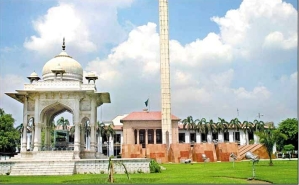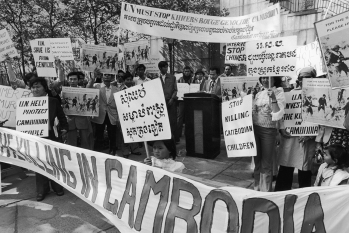
A bill designed to prevent child marriages in Pakistan’s most populated province has raised hope for protection of Christian girls and others from Muslims abducting and forcibly marrying and converting them, sources said.
The Punjab Province government on Thursday (April 25) submitted the draft of the Punjab Child Marriage Restraint Act, 2024 with the Punjab Home Department, which would raise the legal age for marriage for both boys and girls to 18 years; previously the age for girls was 16.
Introduced by Member of Punjab Assembly Sarah Ahmad, who is also chairperson of the Child Protection & Welfare Bureau (CPWB), the bill would criminalize underage marriages. Anyone who marries a girl or boy under 18 or arranges such a marriage – including parents or guardians – would face two to three years in prison and a fine of between 100,000 Pakistani rupees (US$358) and 200,000 rupees (US$717).
Religious freedom advocates termed the bill a “big gain” in efforts to protect minor girls from sexual exploitation as they are forcibly converted and married, but they called for the law to be equally applied to cases of girls belonging to minority religions in the 96-percent Muslim country.
“It has been a longstanding demand of the civil society to end the gender-based age discrimination in Punjab’s child marriage restraint act,” said Peter Jacob, executive director of research and advocacy organization the Center for Social Justice. “Raising the legal marriage age to 18 years for both boys and girls will help in preventing child marriages, but certain amendments are required to ensure that minority girls also get due coverage of the law.”
A veteran rights activist based in Lahore, Punjab Province, Jacob was awarded the U.S. State Department’s Religious Freedom Award earlier this year for his efforts to uphold human rights in Pakistan. He said the law should override all “special” laws and maxims related to determining of a girl’s age of maturity.
“This is particularly important for the protection of underage minority girls who are victimized through forced conversions and marriages under the cover of ‘special’ laws,” Jacob told Christian Daily International-Morning Star News, referring to sharia (Islamic law) allowing girls attaining puberty to be considered adults.
Those who can file charges of child marriage under the bill include parents or guardians, neighbors, community members, teachers, members of local bodies, social workers, friends, imams, Nikah Khawan (marriage solemnizers) and Nikah (Islamic marriage certificate) registrars.
At the time of marriage registration, the marriage solemnizer, secretary of the union council and marriage registrar under the legislation would check the computerized national identity card (CNIC) of the girl or boy, passport, educational certificate or other documents proving both of them are 18 years of age. Attested copies of these documents are required to be attached with the application of marriage certificate.
“Violation of law or omission shall constitute an offense punishable under Section 6 of Punjab Child Marriage Restraint Act, 2024,” the bill states. “In case of any dispute regarding determination of age of any of the parties to marriage, the court shall determine the age on the basis of birth certificate, educational certificate or other necessary documents after hearing the case.”
In the absence of these documents, the age of both parties would be determined through medical examination, it states.
As soon as a case of child marriage is reported, police and courts would take notice, and a court can try the case even before marriage takes place, under the bill.
Violators would be subject to arrest by police employing an irrevocable warrant. Under the Code of Criminal Procedure 1898, the family court would have powers of Judicial Magistrate of First Class. Those convicted by family courts may appeal to sessions courts.
‘Equal Enforcement’
Christian lawmaker in the Punjab Assembly Ejaz Augustine said that Christian lawmakers will fully support it when it’s presented in the legislature for debate.
“I’ve decided to introduce an amendment in the draft bill to ensure that Christian and other minority underage girls get full protection under this law,” he said.
Augustine, a former minister for minorities affairs and human rights in Punjab during the 2018-2022 government of Prime Minister Imran Khan, said he had submitted a bill seeking to prevent forced conversion and forced marriages of minority girls in 2021, but it was not taken up for discussion under pressure from hardline Muslims.
“The Lahore High Court has now ordered the government to end the gender-based age discrimination in the child marriage laws, and I think it is the best time to make a legislation that protects the girl child irrespective of her faith affiliation,” he told Christian Daily International-Morning Star News.
He also called for strict enforcement of the bill if it passes into law.
“There’s a lack of implementation of the existing laws that protect women and girls, therefore it’s very important that the government take measures to ensure that all laws are implemented in letter and spirit,” he added.
Lahore High Court Justice Shahid Karim on April 15 declared as “discriminatory” Punjab Province’s Child Marriage Act of 1929, which fixed 18 and 16 years as legal ages for marriage for boys and girls respectively.
The verdict arose from petitioner Azka Wahid seeking amendments to the Child Marriage Act to avert harmful gender distinctions in accordance with the Constitution of Pakistan’s guarantee of equal rights for men and women.
Activists say that Pakistan’s Islamic clergy play the biggest role in underage marriages involving minority girls, particularly Christians and Hindus. Islamic clerics have fiercely opposed legislation against forced conversions in Sindh Province, and they also censured a federal bill seeking to curb forced conversions in 2021.
“Forced conversion and child marriages are human rights issues, not religious matters, and it is unfortunate that the progressive laws dealing with child marriage and forced faith conversions are resisted by religious groups,” said Adeel Rehmat of faith-based humanitarian group Pak Mission Society.
He said the government must not leave the complaints of forcible religious conversions of minority girls unaddressed.
“It should prioritize criminalizing the practice of forced conversions without surrendering its political will to religious groups that facilitate child marriage and coerced religious conversions,” Rehmat said.
Pakistan ranked seventh on Open Doors’ 2024 World Watch List of the most difficult places to be a Christian, as it was the previous year.




